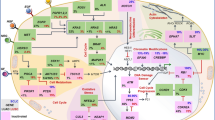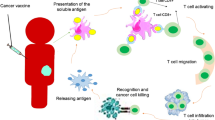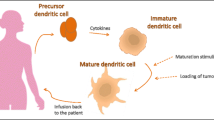Abstract
Background
Pancreatic cancer is a highly lethal malignancy often presenting with advanced disease and characterized by resistance to standard chemotherapy. Immune-based therapies such checkpoint inhibition have been largely ineffective such that pancreatic cancer is categorized as an immunologically “cold tumor”. In the present study, we examine the therapeutic efficacy of a personalized cancer vaccine in which tumor cells are fused with dendritic cells (DC) resulting in the broad induction of antitumor immunity.
Results
In the KPC spontaneous pancreatic cancer murine model, we demonstrated that vaccination with DC/KPC fusions led to expansion of pancreatic cancer specific lymphocytes with an activated phenotype. Remarkably, vaccination led to a reduction in tumor bulk and near doubling of median survival in this highly aggressive model. In a second murine pancreatic model (Panc02), vaccination with DC/tumor fusions similarly led to expansion of tumor antigen specific lymphocytes and their infiltration to the tumor site. Having shown efficacy in immunocompetent murine models, we subsequently demonstrated that DC/tumor fusions generated from primary human pancreatic cancer and autologous DCs potently stimulate tumor specific cytotoxic lymphocyte responses.
Conclusions
DC/tumor fusions induce the activation and expansion of tumor reactive lymphocytes with the capacity to infiltrate into the pancreatic cancer tumor bed.







Similar content being viewed by others
References
Banerjee K et al (2018) Emerging trends in the immunotherapy of pancreatic cancer. Cancer Lett 417:35–46
McGuigan A et al (2018) Pancreatic cancer: a review of clinical diagnosis, epidemiology, treatment, and outcomes. World J Gastroenterol 24:4846–4861
Martinez-Bosch N, Vinaixa J, Navarro P (2018) Immune evasion in pancreatic cancer: from mechanisms to therapy. Cancers (Basel) 10:1–16
Balachandran VP, Beatty GL, Dougan SK, Sloan M, Cancer K (2020) Broadening the impact of immunotherapy to pancreatic cancer: Challenges and opportunities. Gastroenterology 156:2056–2072
Sahin IH, Askan G, Hu ZI, Reilly EMO (2017) Immunotherapy in pancreatic ductal adenocarcinoma : An emerging entity ? Ann Oncol. https://doi.org/10.1093/annonc/mdx503
Feng M et al (2017) PD-1/PD-L1 and immunotherapy for pancreatic cancer. Cancer Lett 407:57–65
Sahin U, Türeci Ö (2018) Personalized vaccines for cancer immunotherapy. Science 80(359):1355–1360
Luo W et al (2020) Novel therapeutic strategies and perspectives for metastatic pancreatic cancer: vaccine therapy is more than just a theory. Cancer Cell Int 20:1–10
Abou-Alfa GK et al (2011) Targeting mutated K-ras in pancreatic adenocarcinoma using an adjuvant vaccine. Am J Clin Oncol 34(3):321–325
Wedén S et al (2011) Long-term follow-up of patients with resected pancreatic cancer following vaccination against mutant K-ras. Int J Cancer 128(5):1120–1128
Torres MP, Chakraborty S, Batra SK (2012) Mucin-based targeted pancreatic cancer therapy. Curr Pharm Des 18(17):2472–2481
Nishida S et al (2018) Combination gemcitabine and WT1 peptide vaccination improves progression-free survival in advanced pancreatic ductal adenocarcinoma: a phase II randomized studywt1 vaccine Plus GEM in pancreatic cancer. Cancer Immunol Res 6(3):320–331
Koido S, Okamoto M, Shimodaira S, Sugiyama H (2016) Wilms’ tumor 1 (WT1)-targeted cancer vaccines to extend survival for patients with pancreatic cancer. Immunotherapy 8(11):1309–1320
Rosenblatt J et al (2011) Vaccination with dendritic cell/tumor fusion cells results in cellular and humoral antitumor immune responses in patients with multiple myeloma. Blood 117:393–402
Rosenblatt J et al (2013) Vaccination with dendritic cell/tumor fusions following autologous stem cell transplant induces immunologic and clinical responses in multiple myeloma patients. Clin Cancer Res 19:3640–3648
Rosenblatt J et al (2016) Individualized vaccination of AML patients in remission is associated with induction of antileukemia immunity and prolonged remissions. Sci Transl Med 8(368):368–368
Hingorani SR, Petricoin EF, Maitra A, Rajapakse V, King C, Jacobetz MA, Tuveson DA (2004) Preinvasive and invasive ductal pancreatic cancer and its early detection in the mouse. Cancer Cell 5(1):103
Zhu K et al (2007) Survivin DNA vaccine generated specific antitumor effects in pancreatic carcinoma and lymphoma mouse models. Vaccine 25:7955–7961
Ishizaki H et al (2011) Modified vaccinia Ankara expressing survivin combined with gemcitabine generates specific antitumor effects in a murine pancreatic carcinoma model. Cancer Immunol Immunother 60:99–109
Ansari D et al (2016) Pancreatic cancer: Yesterday, Today and Tomorrow. Futur Oncol 12:1929–1946
Brahmer JR et al (2012) Safety and activity of anti–PD-L1 antibody in patients with advanced cancer. New Engl J Med 366(26):2455–2465
Kelly F, Victoria K, Elizabeth J, Lei Z (2016) Current progress in immunotherapy for pancreatic cancer. Cancer Lett 381:244–251
Herbst RS et al (2014) Predictive correlates of response to the anti-PD-L1 antibody MPDL3280A in cancer patients. Nature 515(7528):563–567
Patnaik A et al (2015) Phase I Study of Pembrolizumab (MK-3475; Anti-PD-1 Monoclonal Antibody) in Patients with Advanced Solid Tumors. Clin Cancer Res 21:4286–4293
Royal RE et al (2010) Phase 2 trial of single agent Ipilimumab (anti-CTLA-4) for locally advanced or metastatic pancreatic adenocarcinoma. J Immunother 33(8):828
Naing A et al (2018) Epacadostat plus durvalumab in patients with advanced solid tumors preliminary results of the ongoing open-label phase I/II ECHO-203 study. Cancer Res 78:13
Aglietta M et al (2014) A phase I dose escalation trial of tremelimumab (CP-675,206) in combination with gemcitabine in chemotherapy-naive patients with metastatic pancreatic cancer. Ann Oncol 25(9):1750–1755
Von Hoff DD et al (2011) Gemcitabine plus nab-paclitaxel is an active regimen in patients with advanced pancreatic cancer: a phase I/II trial. J Clin Oncol 29(34):4548
Conroy T et al (2011) FOLFIRINOX versus gemcitabine for metastatic pancreatic cancer. New Engl J Med 364(19):1817–1825
Gabriel ANA et al (2020) Differences between KC and KPC pancreatic ductal adenocarcinoma mice models, in terms of their modeling biology and their clinical relevance. Pancreatology 20(1):79–88
Hashimoto D et al (2016) Heterogeneity of KRAS mutations in pancreatic ductal adenocarcinoma. Pancreas 45(8):1111–1114
Waddell N et al (2015) Whole genomes redefine the mutational landscape of pancreatic cancer. Nature 518(7540):495–501
Hingorani SR et al (2005) Trp53R172H and KrasG12D cooperate to promote chromosomal instability and widely metastatic pancreatic ductal adenocarcinoma in mice. Cancer Cell 7(5):469–483
Provenzano PP et al (2012) Enzymatic targeting of the stroma ablates physical barriers to treatment of pancreatic ductal adenocarcinoma. Cancer Cell 21(3):418–429
Ijichi H et al (2011) Inhibiting Cxcr2 disrupts tumor-stromal interactions and improves survival in a mouse model of pancreatic ductal adenocarcinoma. J Clin Invest 121:4106–4117
Massó-Vallés D et al (2015) Ibrutinib exerts potent antifibrotic and antitumor activities in mouse models of pancreatic adenocarcinoma. Cancer Res 75:1675–1681
Olive KP, Jacobetz MA, Davidson CJ, Gopinathan A, McIntyre D, Honess D, Tuveson DA (2009) Inhibition of hedgehog signaling enhances delivery of chemotherapy in a mouse model of pancreatic cancer. Science 324(5933):1457–1461
Sherman MH et al (2014) Vitamin D receptor-mediated stromal reprogramming suppresses pancreatitis and enhances pancreatic cancer therapy. Cell 159(1):80–93
Author information
Authors and Affiliations
Contributions
S.O contributed by writing the manuscript, designing and conducting experiments, and acquiring and analyzing data. L.H. and O.G. provided cells and helped writing the manuscript. J.M. and C.D. provided patient samples. D.S. helped in designing experiments, analyzing data, and writing of the manuscript. A.E. helped in conducting experiments. J.R. helped in designing experiments and analyzing the data. D.A. contributed to designing experiments, analyzing data and writing of the manuscript. J.L. and G.C. helped in experiment designing and data analysis while D.T. and C.T. helped in conducting experiments. DK, MH, and SM participated in experimental design and review of the manuscript.
Corresponding author
Ethics declarations
Competing interests
Funded in part by V Foundation.
Study approval
All animal studies were approved by BIDMC IACUC.
Additional information
Publisher's Note
Springer Nature remains neutral with regard to jurisdictional claims in published maps and institutional affiliations.
Rights and permissions
About this article
Cite this article
Orr, S., Huang, L., Moser, J. et al. Personalized tumor vaccine for pancreatic cancer. Cancer Immunol Immunother 72, 301–313 (2023). https://doi.org/10.1007/s00262-022-03237-x
Received:
Accepted:
Published:
Issue Date:
DOI: https://doi.org/10.1007/s00262-022-03237-x




